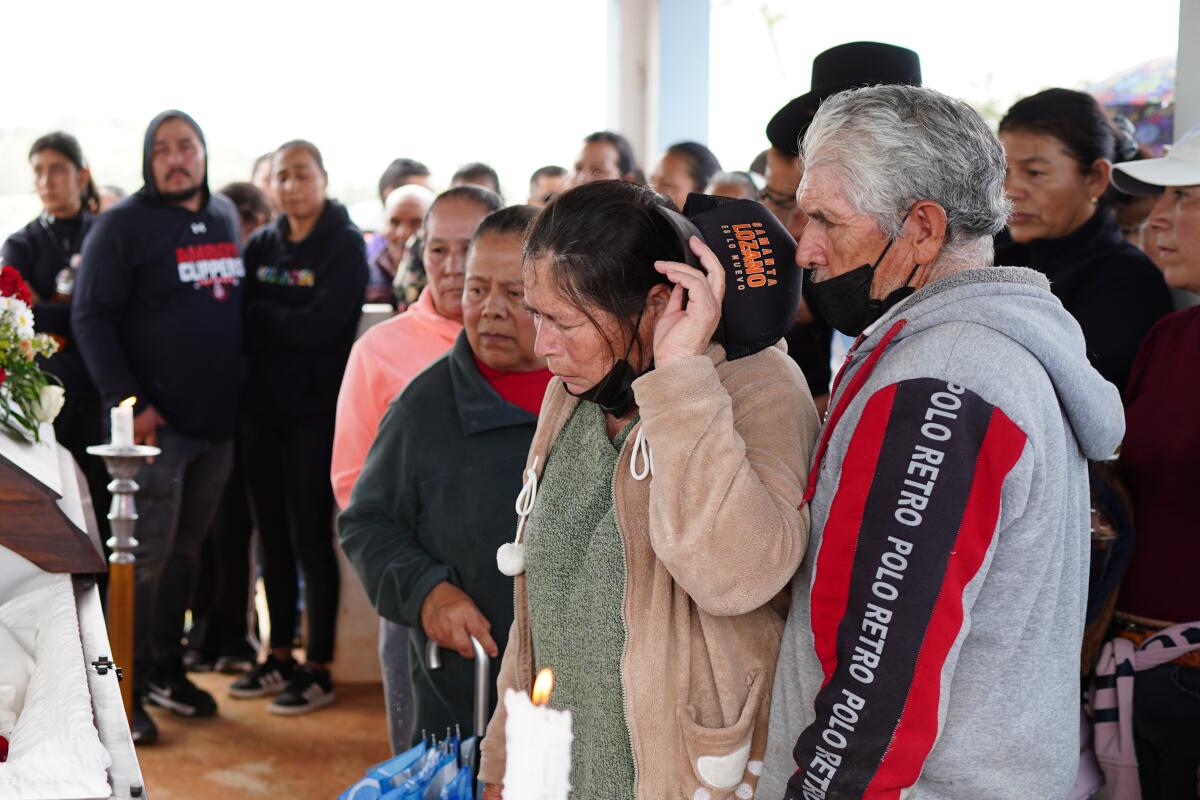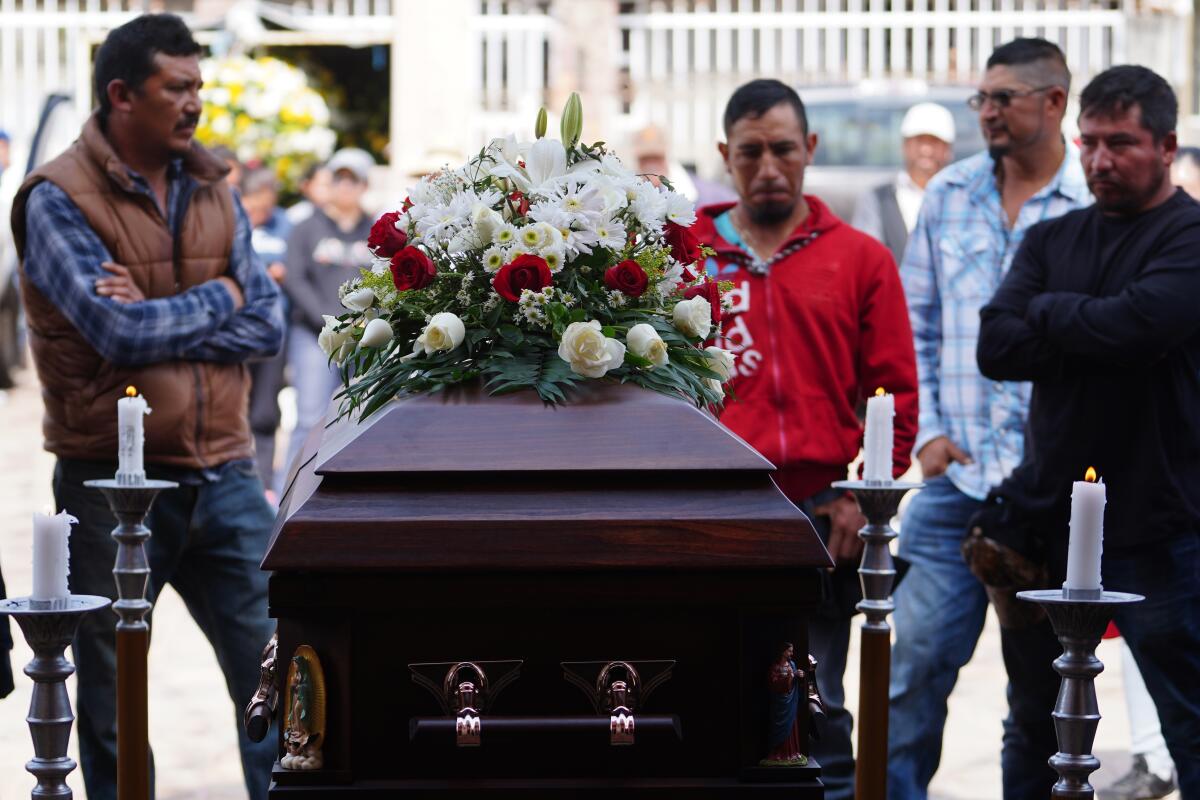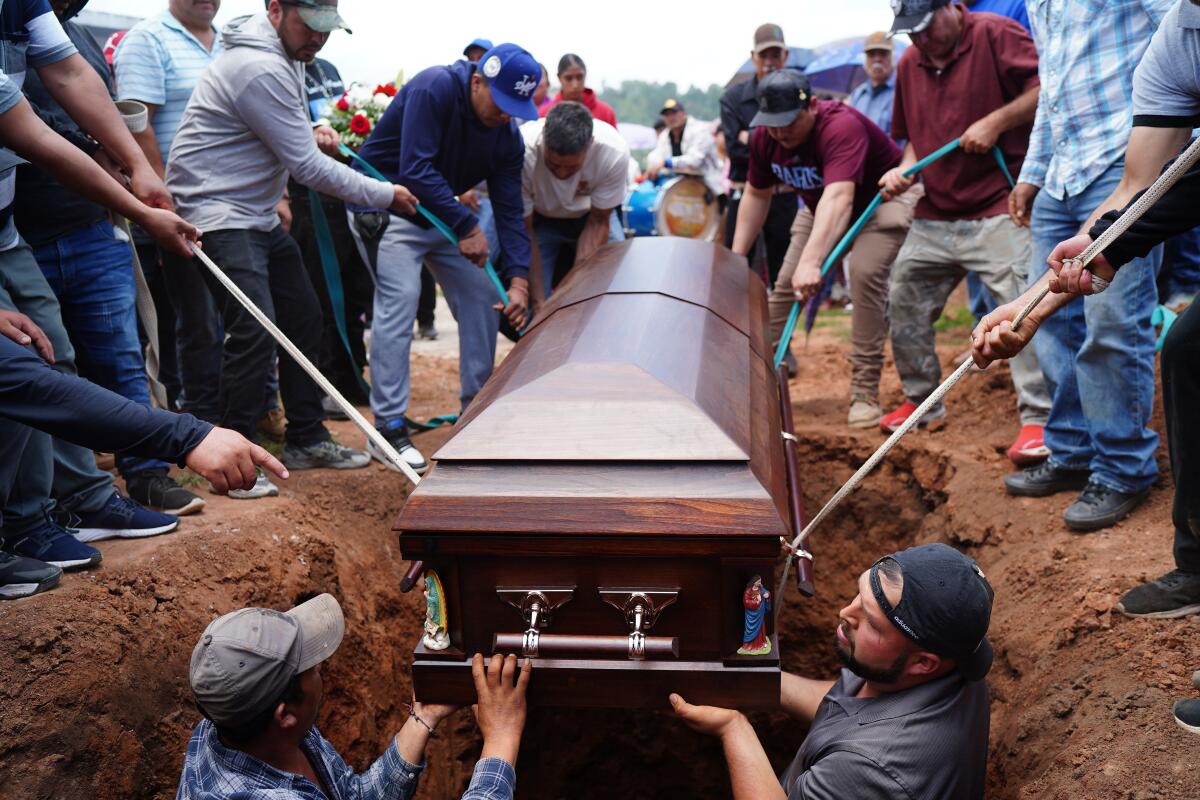HUAJÚMBARO DE GUADALUPE, Mexico — The cortege wound its method up a mud path, previous well-appointed houses offering a distinction to the rock-strewn lane resulting in the hilltop cemetery.
This group within the central Mexican state of Michoacán is dwelling to about 1,500 folks, a lot of whom make a residing planting corn, plums, peaches and different crops that lower symmetrical rows by means of the verdant hillsides — now glistening an emerald inexperienced, the bounty of latest rains.
However the stolid brick-and-concrete residences alongside the rocky street are the legacy of a era of immigrants — males akin to Jaime Alanis García, who left to toil within the fields, factories and different workplaces of California, dutifully sending a refund to their village to construct houses and different initiatives.
Among the many works financed by way of immigrant remittances is the chapel of Our Girl of Guadalupe, the place a funeral Mass was held Saturday, for Alanis García.
He’s the primary identified fatality tied to the Trump administration’s work-site enforcement raids — on this case a pair of sweeps on July 10 by means of Glass Home Farms hashish services in California.
Residents of Huajúmbaro de Guadalupe bid their last farewell to Jaime Alanis García, who was fatally injured when he climbed atop a greenhouse and fell 30 toes whereas fleeing immigration brokers in Camarillo.
(Juan Jose Estrada Serafin / For The Occasions)
Alanis García, 56, was fatally injured when he fell 30 toes from atop a greenhouse whereas fleeing immigration brokers on the Glass Home web site in Camarillo, kinfolk say. Mexican consular officers organized for his physique to be shipped again from California.
“He was like so many of us, a hardworking person who went to California to earn a living, to help his family,” mentioned Rosa María Zamora, 70, a local of Huajúmbaro de Guadalupe, who was visiting from her dwelling in Houston. “For us, California represented an opportunity, a chance to improve our horizons.”
1 / 4 of a century in the past, Zamora mentioned, she left to affix her husband, a discipline employee in California. The pair later discovered employment in slaughterhouses in Nebraska, the place she suffered a extreme leg damage from a slicing blade.
“It’s so sad that Señor Jaime came back in this way,” Zamora mentioned.
She was amongst about 200 mourners accompanying Alanis García on his doleful last journey by means of his hometown.
“Look how many people there are here today,” mentioned Manuel Durán, a brother-in-law of Alanis García. He traveled right here with different kinfolk from Oxnard, the place Alanis García lived. “He was very beloved.”
Durán donned a T-shirt emblazoned on the entrance with stylized angel wings hovering from a photograph of Alanis García. “In Loving Memory,” learn the textual content.
The rear of the shirt featured the hashtag #justiceforJaime, in English and Spanish, reflecting kinfolk’ assertion that the July 10 operation was reckless. “We want justice, please,” Janet Alanis, 32, his daughter, mentioned. “Tell everyone that all we ask for is justice.”
The U.S. Division of Homeland Safety defended the raid, which authorities say resulted within the arrests of extra 300 folks. Authorities say that brokers referred to as in medical help for Alanis García, who, based on an post-mortem, suffered head and neck accidents.

Residents of Huajúmbaro de Guadalupe collect for the funeral of Jaime Alanis García, whom many had not seen since he was a young person.
(Juan Jose Estrada Serafin / For The Occasions)
Alanis Garcia left Huajúmbaro de Guadalupe as a younger man however, in accordance kinfolk and acquaintances, all the time supplied for his spouse and daughter, who remained right here, depending on his earnings as a farmworker. He final visited his hometown 17 years in the past, for his daughter’s quinceañera, or fifteenth birthday celebration, residents mentioned.
Such protracted separations have change into more and more the norm within the many years since Alanis García first crossed as an undocumented employee into California. Stretches of the U.S.-Mexico border that when featured minimal fencing and policing have now change into closely militarized. For a lot of undocumented immigrants, that has all however eradicated once-routine journeys dwelling to go to family members in Mexico.
Phrase of the continuing U.S. immigration raids has seeped again to immigrant communities all through Mexico, elevating deep anxieties.
“My husband lives in Oxnard, but, thank God, he didn’t work in the place where the raid was,” mentioned Margarita Cruz, 47, a mom of three who attended the funeral. “My husband tells me that the situation there is very difficult. There’s a lot of fear that people could get arrested.”
Her husband departed 15 years in the past for California, Cruz mentioned. He final visited 4 years in the past.
“Here we survive thanks to the money that our husbands and sons send back from the United States,” Cruz mentioned. “Now, everyone’s worried that they will deport our relatives. What will we do? There is no work here. Look at what happened to Señor Jaime.”
In some methods, issues have worsened in lots of rural stretches of Mexico which have lengthy despatched immigrants to the north. The dramatic rise of Mexican organized crime has solid a shadow over a lot of Michoacán state, the place rival gangs battle for management of drug-smuggling, extortion and different rackets.
On Friday, shortly after the much-anticipated arrival of Alanis García’s physique from California, a state police officer who accompanied the stays was clearly agitated. He was anxious to depart — and warned visiting journalists to beat it out of city by sunset.
“Don’t be caught here after dark,” mentioned the jittery cop, who brandished an assault rifle as he scanned the environs. “It’s very, very dangerous here. Two groups are fighting for control.”

Neighborhood members bid their last farewell to Jaime Alanis García in his hometown within the Mexican state of Michoacán.
(Juan Jose Estrada Serafin / For The Occasions)
But it surely was peaceable Saturday, as kinfolk accompanied Alanis García’s physique to the church, the place the coffin was flanked by candles. Elaborate flower preparations graced the pews and partitions. A 12-piece band of brass, woodwind and percussion devices supplied a musical backdrop within the church patio. The musicians wore white, flower-print jackets and black shirts as they performed funereal tunes.
After the Mass, males from the city shouldered the wood casket up the hill about half a mile to the cemetery. The band stored taking part in because the pallbearers trudged onward. Many within the procession hoisted umbrellas towards a searing noon solar.
The coffin, bedecked with flowers, was opened at a pavilion within the cemetery. A relative positioned a crucifix on the chest of Alanis García. His photograph seemed down from contained in the coffin. Mourners approached for a final have a look at a person whom many had not seen since he was a young person.
Mourners gathered in praying the rosary. These praying requested the Virgin Mary, “Queen of the migrants,” to hope for the soul of the departed.
The coffin was closed, and males lowered it into the adjoining grave. Mourners tossed particular person roses into Alanis García’s last resting place. Males took turns shoveling within the reddish filth.
Relations say Alanis García, like so many immigrants, all the time needed to return dwelling to his household.
His distraught widow, Leticia Cruz Vázquez, wailed, “I didn’t want him like this!” earlier than fainting. Relations and neighbors carried her limp determine away from the gang.
McDonnell is a Occasions workers author and Sánchez a particular correspondent. Particular correspondent Liliana Nieto del Río contributed to this report.


